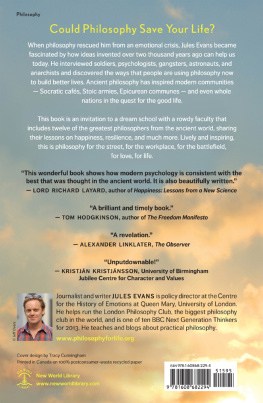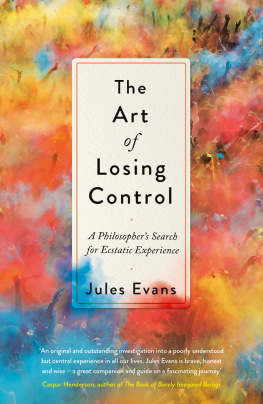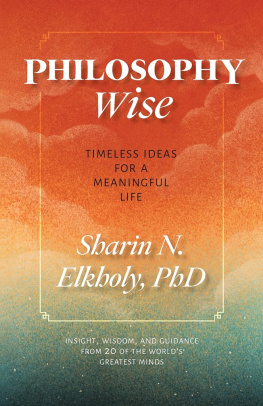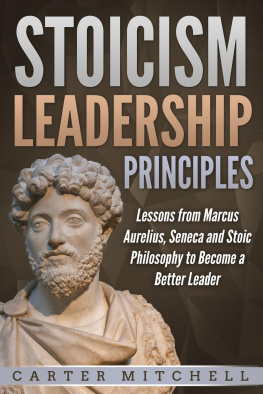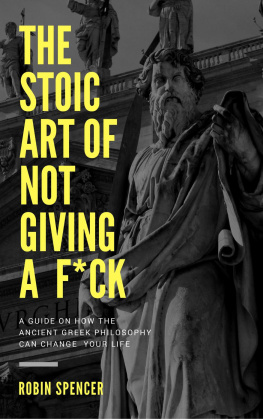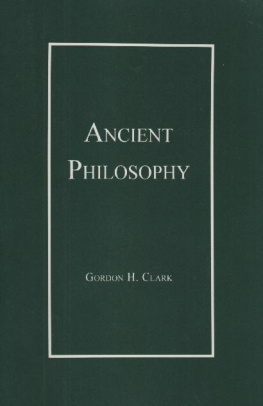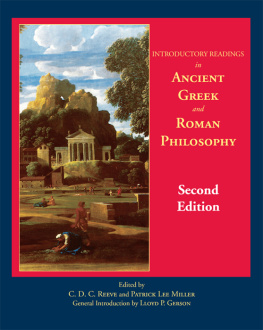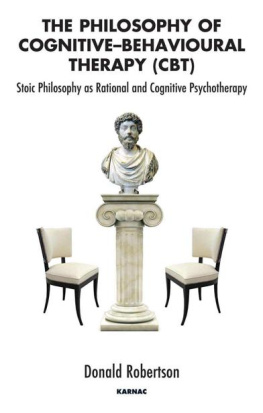


Copyright 2012 by Jules Evans
All rights reserved. This book may not be reproduced in whole or in part, stored in a retrieval system, or transmitted in any form or by any means electronic, mechanical, or other without written permission from the publisher, except by a reviewer, who may quote brief passages in a review.
First published in Great Britain in 2012 by Rider Books, an imprint of Ebury Publishing, a Random House Group company. www.randomhouse.co.uk
Text design by Tona Pearce Myers
Library of Congress Cataloging-in-Publication Data
Evans, Jules.
Philosophy for life and other dangerous situations : ancient philosophy for modern problems / Jules Evans.
pages cm
Originally published: London : Rider Books, 2012.
Includes bibliographical references and index.
ISBN 978-1-60868-229-4 (pbk. : alk. paper) ISBN 978-1-60868-230-0 (ebook)
1. Philosophy, Ancient. 2. Conduct of life. I. Title.
B111.E93 2013
First New World Library edition, October 2013
ISBN 978-1-60868-229-4
Printed in Canada on 100% postconsumer-waste recycled paper
 | New World Library is proud to be a Gold Certified Environmentally Responsible Publisher. Publisher certification awarded by Green Press Initiative. www.greenpressinitiative.org |
10 9 8 7 6 5 4 3 2 1
To my mother and father, with love
When evening comes, I return home and go into my study. On the threshold I strip off my muddy, sweaty, workday clothes, and put on the robes of court and palace, and in this graver dress I enter the antique courts of the ancients and am welcomed by them, and there I taste the food that alone is mine, and for which I was born. And there I make bold to speak to them and ask the motives of their actions, and they, in their humanity, reply to me. And for the space of four hours I forget the world, remember no vexation, fear poverty no more, tremble no more at death
NICCOL MACHIAVELLI
Contents
POPE JULIUS II WAS A GREAT ENTHUSIAST for home improvement. Not content with commissioning Bramante to design the dome of St. Peters Basilica, or Michelangelo to paint the Sistine Chapel ceiling, his Holiness hired a relatively unknown twenty-seven-year-old from Urbino, called Raphael, to paint a series of huge frescoes on the walls of his private library in the Vatican Palace. The frescos would represent the main subjects found in Juliuss library: theology, law, poetry, and philosophy. It is the last fresco, which has come to be called The School of Athens, which is particularly admired today. In it, Raphael presents a group of philosophers from the ancient world, mainly from Greece but also from Rome, Persia, and the Middle East, gathered together in animated conversation. Academics are not certain exactly which philosophers are depicted in the painting. Theyre sure the two figures debating in the center of the painting are Plato and Aristotle, as theyre holding their books. Theyre fairly sure the philosopher in the front left writing equations is Pythagoras, and the melancholy philosopher sitting alone is Heraclitus. The rather louche figure sprawled on the marble steps is probably Diogenes the Cynic. Socrates is in the back row, interrogating a pretty youth, and the smiling, garlanded philosopher on the far left may be Epicurus. What is clear is that this is a very heterogeneous group of philosophers, who put forward distinct and radical ideas, many of which were well beyond the limits of Catholic dogma. Epicurus was a materialist, Plato and Pythagoras believed in reincarnation, Heraclitus believed in a cosmic intelligence made of fire. And yet here they all are together, bursting out from the wall of the Vatican Palace.
The School of Athens is one of my favorite paintings. I love its balance between order and anarchy, the distinctness of the personalities but also the underlying unity in their ideas. I love how, at the center of the painting, in bright flowing robes, Plato and Aristotle are engaged in an argument, the one pointing up to the heavens, the other pointing down to the street. And I love the urban setting, how its not clear if its a temple, or a marketplace, or an arcade in some ideal city, where everyone can engage in the conversation, and the everyday is connected to the divine. As I look at the painting, I wonder: What would it be like to join in that conversation? What would it be like to study at the School of Athens, to listen to those great teachers, and make bold to speak to them? What do they have to say to our time?
This book is my dream school, my ideal curriculum, my attempt to render what it would be like to get a day-pass to the School of Athens. Ive assembled twelve of the greatest teachers of the ancient world to teach us things that are often left out of modern education: how to govern our emotions, how to engage with our society, how to live. They teach us the art of self-help (Cicero writes that philosophy teaches us to be doctors to ourselves), but self-help of the very best kind, that doesnt focus narrowly on the individual, but instead broadens our minds and connects us to society, science, culture, and the cosmos. The course is not prescriptive the faculty dont agree with each other (in fact, some of them actively dislike each other), and the book doesnt put forward one philosophy, but several. And yet, as in Raphaels painting, there is a unity underlying the diversity: all the teachers share an optimism in human rationality, and in the ability of philosophy to improve our lives.
In the morning roll call, Socrates, the headmaster of the school, will tell us why philosophy can help us and speak to our own age. Then the days classes are divided into four sessions. In the morning session, the Stoics will teach us how to be Warriors of Virtue (so called because many of the modern Stoics well meet are soldiers). In the lunchtime session, Epicurus will teach us the art of enjoying the moment. In the early-afternoon session, Mystics and Skeptics, we consider how our personal philosophies are connected to our ideas about the universe and the existence or absence of God. And in the final session, Politics, we consider our relationship to society, and the influence of ancient philosophy on modern politics, before Socrates conducts the graduation ceremony with a lesson on the art of departure. If that leaves you wanting to explore further, theres also a lot of extracurricular activities on my website, which has video and text interviews with some of the people youll meet in the book, plus a global philosophy map showing philosophy groups near you (if you set up your own philosophy group, let me know and Ill add it to the map). And, of course, there are the wonderful books of the philosophers themselves, most of which are available on the site.
I want to re-create the openness and rowdiness you see in Raphaels painting, that sense of an animated street debate that anyone can join. Today, many people are rediscovering the ancients, and using their ideas to live better, richer, and more meaningful lives. Were rejoining that noisy, vibrant conversation that Raphael depicted so beautifully. We make bold to speak to the ancients. And they, in their humanity, reply to us.
Next page
